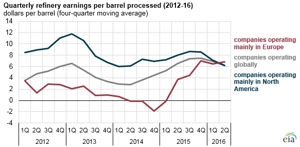EIA: Narrowing crude oil prices contribute to converging refining profits
Earnings per barrel of crude oil and other inputs processed by refiners that operate mainly in North America were lower in the second quarter of 2016 compared with the same time last year and are now close to per-barrel earnings by refiners operating elsewhere. North American refiners, which for years were consistently more profitable than other refiners, were less profitable than European refiners and the global average, based on the four-quarter moving average of profits. Changes in the difference between North American and European crude oil prices are likely contributing to the converging profits.
According to the US Energy Information Administration, recently released Q2 statements from 27 companies show that 21 of them experienced a year-over-year decline in refining profits, as measured by earnings per barrel processed. The decline in earnings was driven largely by the decline in crack spreads (the price difference between crude oil and petroleum products) in Q2. In addition to changes in crack spreads, which serve as an indicator of refinery profits, earnings per barrel reflect transportation costs and other operating expenses. Also, refiners use different crude oil blends and produce different yields of refined products, which changes the per barrel earnings among refiners.
The narrowing gap between refiner crude oil acquisition costs for US and global refiners is a key factor driving the convergence in refinery profits. Because crude oil and petroleum product prices are the two largest factors that affect a refiner's profits, changes in the cost of crude oil can have a significant effect on profitability. North American refiners enjoyed a large discount to global crude oil prices for several years, measured by the difference between North Sea Brent crude oil prices and the US composite refiner acquisition cost. Since Q3 of 2015, the discount has not widened beyond $4.50/bbl, reducing the cost advantage of some US refiners.
In 2012 and 2013, rapid increases in US and Canadian crude oil production and insufficient infrastructure to move this oil to refining centers inexpensively contributed to the wide spread between the Brent price and average US refiner acquisition costs. These factors began to reverse in 2014 and 2015, as new pipeline infrastructure increased takeaway capacity from producing areas to refining areas, such as the BridgeTex and Cactus pipelines in West Texas and Flanagan South in the Midwest. US crude oil production declines, which began on a year-over-year basis in December 2015, also contributed to a comparatively tighter crude oil market in North America.
In the European market, refiners may be achieving increased refining efficiency by consolidating operations. The European companies included in this analysis reduced distillation capacity by 248 Mbpd in 2015, the fourth consecutive year of reductions. In addition, as Russian, Iranian, and Iraqi crude oil production has increased, some European refiners may be receiving lower-priced crude oil. For example, the price of Mediterranean Urals—a Russian crude oil many inland European refiners process—has on average been more than $2.00/bbl less than the price of Brent for most of 2016, the largest sustained price difference since at least 2012. This may also be contributing to higher European refiner profits in recent quarters.
Global crack spreads have remained low in the third quarter of 2016, suggesting continued downward pressure on refinery profits. Absent meaningful changes in crude oil and petroleum product price differentials, however, refinery profits will likely display smaller variability across different locations than occurred between 2012 and 2014.







Comments